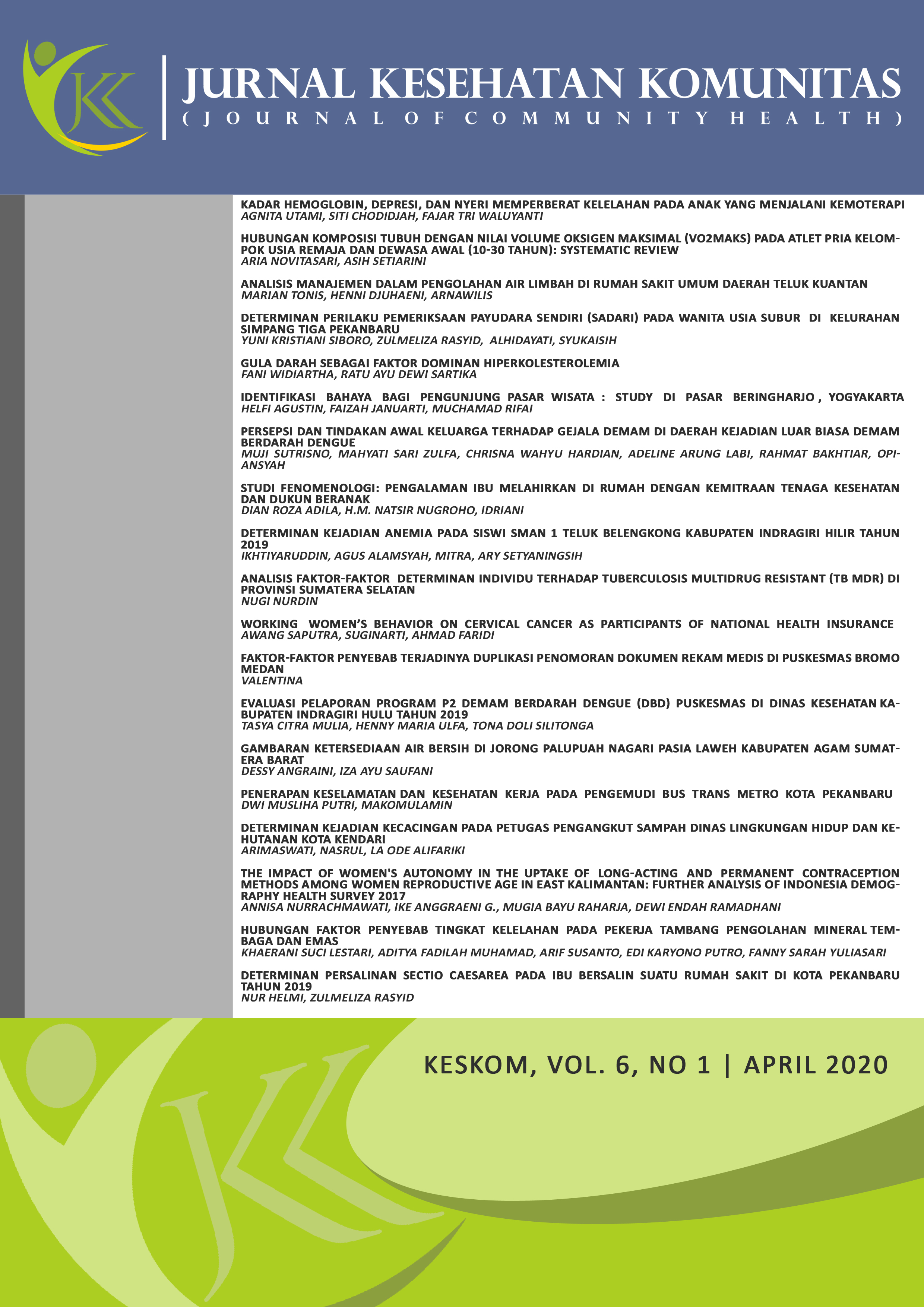BLOOD GLUCOSE AS A DOMINANT FACTOR OF HYPERCHOLESTEROLEMIA
DOI:
https://doi.org/10.25311/keskom.Vol6.Iss1.497Keywords:
hypercholesterolemia, blood glucose, adultAbstract
Cholesterol is a major factor of atherosclerosis. Hypercholesterolemia may increase the risk of developing coronary heart disease, myocardial infarction, cerebral thrombosis, ischemia, and other serious illnesses and even death. The aim of this study is to determine the dominant factors that affect the incidence of hypercholesterolemia in adult patients at Puskesmas Bojong Gede Bogor 2017. Primary data collected using cross-sectional method in Puskesmas Bojong Gede Bogor to 85 respondents aged 25-64 years. The results found that the prevalence of hypercholesterolemia is 62.4%. There was a significant relationship between blood glucose and waist circumference with hypercholesterolemia. Blood glucose level is the dominant factor for hypercholesterolemia. Health agencies are expected to be more active to do health promotion and education about healthy life and do routine health checks.
Downloads
References
Devaranavadgi, B. (2012). Effect of Cigarette Smoking on Blood Lipids – A Study in Belgaum, Northern Karnataka, India. Global Journal of Medical Research Volume 12 Issue 6; 1-7.
Djuwita, Ratna. (2013). Asupan Gizi dan Kadar Low Density Lipoprotein Kolesterol Darah pada Kalangan Eksekutif. Jurnal Kesehatan Masyarakat Nasional Vol. 8, No. 2; 1-9.
Faour, Tarek. (2015). Blood Lipid Disorder In Men With Increased Waist Circumference Compared To Men Having Normal Waist Circumference Within the Same Category of BMI. European Scientific Journal. Special Edition Vol.2: 1857 – 7881.
Feigin, Valery L., et al. (2016). Global burden of stroke and risk factors in 188 countries, during 1990–2013: a systematic analysis for the Global Burden of Disease Study 2013. Lancet Neurol. Vol 15: 913–24.
Ganong, William F. Buku Ajar Fisiologi Kedokteran, Edisi 22 alih bahasa: Brahm U, editor: Andita Novrianti, et al. Jakarta: EGC. 2008.
Gupta, R. (2008). Epidemiology and causation of coronary heart disease and stroke in India. Heart. Vol 94:16–26. doi:10.1136/hrt.2007.132951.
Guyton, Artur C & Hall, John E. Textbook of Medical Physiology 11th Edition. China: Elsevier Saunders. 2006.
Kementerian Kesehatan Republik Indonesia. Riset Kesehatan Dasar 2013. Jakarta: Kementerian Kesehatan RI. 2013.
Listiyana, Aulia Dewi., Mardiana, & Prameswari, Galuh Nita. (2013). Obesitas Sentral Dan Kadar Kolesterol Darah Total. Jurnal Kesehatan Masyarakat. Vol 9 (1); 37-43.
Melendez, Velasquez, et al (2007). Genetic Determinans of Risk Factors for Cardiovascular Disease in a Population from Rural Brazil. Human Biology. Vol. 79 (2):179-190.
Narayan, Shreya. (2014). Association of Dietary Fiber Intake with Serum Total Cholesterol and Low Density Lipoprotein Cholesterol Levels in Urban Asian‑Indian Adults with Type 2 Diabetes. Indian Journal of Endocrinology and Metabolism. Vol 18 | Issue 5; 1-8.
NIH. (2005). Nutrition Cholesterol Education Program (NCEP). High Blood Cholesterol What You Need to Know. US Department of Health and Human Service. National Institute of Health. 2005.
Pasiakos, Stefan M., Lieberman, Harris R., & Fulgoni, Victor L. (2015). Higher Protein Diets Are Associated with Higher HDL Cholesterol and Lower BMI and Waist Circumference in US Adults. The Journal of Nutrition. Vol 21, 1-7.
Reiner, Zeljko. (2011). Guidelines for the Management of Dyslipidemias. European Heart Journal. Vol. 32; 1769–1818.
Sari, YD (2013). Hubungan Asupan Serat dengan Kadar Kolesterol LDL Penduduk Usia 25-65 Tahun di Kelurahan Kebon Kalapa Bogor Tahun 2013. FKM UI. 2013.
Shriram, Rathod Shivanand. (2015). Effect of Physical Training on Lipid Profile In Healthy, Youngmales: A Followup Study. International Journal of Physiotherapy and Research. Vol 3(3):1081-85.
Soleha, Maratu. (2012). Kadar Kolesterol Tinggi Dan Faktor-Faktor Yang Berpengaruh Terhadap Kolesterol Darah. Jurnal Biotek Medisiana Indonesia. Vol. 1 (2): 85-92.
Sudikno. (2016). Hubungan Obesitas Sentral Dengan Profil Lipid Pada Orang Dewasa Umur 25-65 Tahun di Kota Bogor (Baseline Studi Penyakit Tidak Menular di Kota Bogor, Jawa Barat). Gizi Indonesia. Vol 39(2):81-92.
Tsaousis, Konstantinos. (2014). Blood Glucose and Cholesterol Concentration in a Mediterranean Rural Population of Andros Island, Greece. International Journal of Preventive Medicine. Vol 5(11): 1464 - 1467.
Toth, Peter P & Maki, Kevin C. Practical Lipid Management: Concept and Controversies. Great Britain: A John Wiley & Son Ltd Publication. 2008.
Waloya, T., Rimbawan, & Andarwulan, N. (2013). Hubungan Antara Konsumsi Pangan Dan Aktivitas Fisik Dengan Kadar Kolesterol Darah Pria Dan Wanita Dewasa Di Bogor. Jurnal Gizi Dan Pangan, 8(1), 9-19
WHO. Global Status Report on NCDs 2010. http://www.who.int/gho/ncd/risk_factors/cholesterol_text/en/ diakses 7 Feb 2019.
Wilson, Peter W F. Epidemiology of Blood Lipids and Lipoproteins Dalam Garg, Abimanyu Dyslipidemias Pathophysiology, Evaluation, and Management. New York: Humana Press. 2015.
Zheng, Jie. (2014). Gender differences in the relationship between plasma lipids and fasting plasma glucose in non-diabetic urban Chinese population: a cross-section study. Front Med. Vol 8(4): 477–483.

Downloads
Submitted
Accepted
Published
How to Cite
Issue
Section
License
Copyright (c) 2020 Jurnal Kesehatan Komunitas

This work is licensed under a Creative Commons Attribution-NonCommercial-ShareAlike 4.0 International License.
Copyright @2017. This is an open-access article distributed under the terms of the Creative Commons Attribution-NonCommercial-ShareAlike 4.0 International License (http://creativecommons.org/licenses/by-nc-sa/4.0/) which permits unrestricted non-commercial used, distribution and reproduction in any medium










































